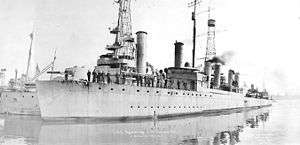Flush deck
Flush deck is a term in naval architecture. It can refer to any deck of a ship which is continuous from stem to stern. It has two specific common referents:
- Flush deck aircraft carriers are those with no island superstructure, so that the top deck of the vessel consists of only an unbroken flight deck.
- "Flush deckers" is a common nickname for a series of American destroyers built in large quantities during or shortly after World War I – the Caldwell, Wickes, and Clemson classes – so called because they lacked the raised forecastle of preceding American destroyers, thus the main deck was a flush deck.[1]
Two different meanings of "flush"
"Flush deck" with "flush" in its generic meaning of "even or level; forming an unbroken plane", is sometimes applied to vessels, as in describing yachts lacking a raised pilothouse for instance. "Flush deck aircraft carrier" uses "flush deck" in this generic sense.
"Flush deck" in its more specific maritime-architecture sense denotes (for instance) the flush deck destroyers described above: the flush decks are broken by masts, guns, funnels, and other structures and impediments, and are far from being unbroken planes. "Flush deck" in this sense only signifies that the main deck runs the length of the ship and does not end before the stem (with a separate raised forecastle deck forward) or before the stern (with a separate raised or, as seen on many modern warships, lowered quarterdeck rearward).
| The USS Allen is not a flush-deck vessel: note the raised forecastle deck forward, running about one-quarter the length of the ship |
| In contrast, the flush-deck USS Sigourney (later HMS Newport) has no forecastle |
| The USS Belknap, a later example of a non-flush-deck ship, with the main deck giving way to a lower quarterdeck towards the stern |
|
References
.jpg)


